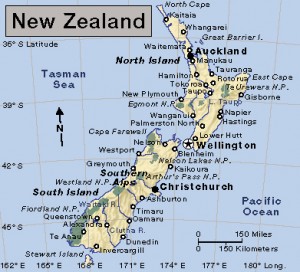Asian and Pacific Heritage Month: Filmmaker Taika Waititi
Monday, May 23rd, 2022May is Asian American and Pacific Islander (AAPI) Heritage Month. All month long, Behind the Headlines will celebrate the accomplishments and heritage of Asians and Pacific Islanders.
Taika Waititi is a New Zealand filmmaker known for his comedies. In 2020, he became the first person of Māori ancestry to win an Academy Award for best adapted screenplay. He won for the motion picture Jojo Rabbit (2019), based on the novel Caging Skies (2008) by Christine Leunens. He was also the first Indigenous (native) writer to be nominated for an Academy Award for a screenplay. Jojo Rabbit tells the story of a German boy whose mother is hiding a Jewish girl in their home during World War II (1939-1945). The boy struggles with his beliefs in Nazism and anti-Semitism (prejudice against Jews). He confronts these ideas in part in the form of his imaginary friend, a buffoonish Adolf Hitler, played by Waititi in the film.
Taika Cohen was born on Aug. 16, 1975, in Raukokore, on the North Island of New Zealand. For his professional career, he later adopted the surname of his father, the Māori artist Taika Waititi, who also went by Tiger. Taika means tiger in the Māori language. The young Taika grew up in Wellington with his mother, the educator Robin Cohen. He graduated from Victoria University of Wellington in 1997 with a degree in theater and arts. At the school, he formed a comedy duo called The Humourbeasts with the comic musician Jemaine Clement. Waititi later directed and wrote a few episodes of the television series “The Flight of the Conchords” (2007-2009) in which Clement co-starred with Bret McKenzie.
Waititi made his screen acting debut in the motion picture Scarfies (1999). He showed his first short film, John & Pogo (2002), at the New Zealand International Film Festival. His next short film, Two Cars, One Night (2003), was nominated for an Academy Award. Waititi’s first feature-length film was Eagle vs. Shark (2007). Both Eagle vs. Shark and his second feature film, Boy (2010), premiered at the Sundance Film Festival. Boy is a comedy-drama about the reunion of a Māori son with his father, played by Waititi. Waititi wrote and directed Hunt for the Wilderpeople (2016). It surpassed Boy as the highest-grossing New Zealand-made film of all time.
Waititi and Clement co-wrote, co-directed, and starred in the short film What We Do in the Shadows: Interviews with Some Vampires (2005). It was expanded into a mockumentary (satirical documentary) film What We Do in the Shadows (2014), followed by a television series of the same name starting in 2019.
Waititi directed the Marvel Studios film Thor: Ragnarok (2017) and its sequel Thor: Love and Thunder (2022), which he also cowrote. He provided the voice for the rocklike warrior Korg in these and other Marvel Studios productions. Waititi has also worked on projects set in the “Star Wars” universe. Starting in 2022, he produced the comedy series “Our Flag Means Death.” The show follows Stede Bonnet, an aristocrat turned pirate who sailed with the famous Blackbeard, played by Waititi.





